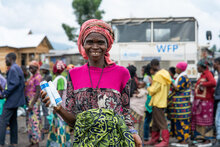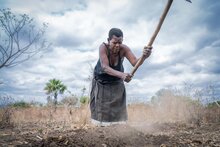Malian Refugees In Burkina Faso Risk Losing Life-Saving Support
The two agencies have since 2012 been working closely with the government of Burkina Faso and non-governmental organisations to assist the Malian refugees who fled the conflict in northern Mali and continue to rely on external support.
In 2015, WFP provided food assistance to up to 31,000 Malian refugees through rations and cash transfers. Towards the end of 2015, however, lack of funding forced WFP to interrupt its food assistance for a month. As of 2016, WFP is providing reduced food rations, and no cash assistance. This has led to about a quarter of the refugees not having enough food to meet their nutritional needs.
“Most refugees in the camps depend solely on humanitarian assistance to survive. When assistance is interrupted or insufficient, the food security and nutrition situation dramatically deteriorate, especially for women, children and elderly people. We are already seeing people resorting to extreme means to survive, such as incurring significant debts to buy food,” said Jean-Charles Dei, WFP Country Director in Burkina Faso.
According to a recent UNHCR/KALYTA study, annual interest rates from informal money lenders were as high as 1,000% in 2015.
“This is a crucial period as people brace for a harsh lean season. They need support now more than ever. If nothing is done, this could have tragic consequences. WFP urgently requires US$ 2.5 million to provide the refugees with the assistance that they need,” added Dei.
“As the situation in Northern Mali remains unstable, we expect few voluntary returns in 2016. The Malian refugees in Burkina depend on us. Funding is crucial to continue providing them with life-saving assistance. Since 2012, we have seen consistent improvements in terms of access to food and nutrition support in the two camps. This is a result of joint efforts and this must be maintained,” said Gogo Hukportie, UNHCR Representative in Burkina Faso.
Malian refugees have been battling with recurrent droughts, floods, and chronic poverty. They have limited employment and livelihood opportunities. Without support, there are concerns that people could resort to even more desperate measures, including young people joining armed groups.
# # #
WFP is the world's largest humanitarian agency fighting hunger worldwide, delivering food assistance in emergencies and working with communities to improve nutrition and build resilience. Each year, WFP assists some 80 million people in around 80 countries.
UNHCR leads and coordinates international action for the worldwide protection of people forced to flee, to safeguard the rights and well-being of refugees. For over six decades, in nearly every major displacement crisis, UNHCR helped tens of millions of uprooted people, providing durable solutions to their plights.
For more information please contact:
WFP Burkina Faso
Jean-Charles Dei, Country Director, jean-charles.dei@wfp.org, +226 25306077
UNHCR Burkina Faso
Gogo Hukportie, Representative, hukporti@unhcr.org, +226 25361028/29/31


